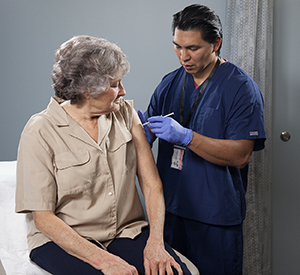Pneumococcal Vaccine: Why It's Important
What is pneumococcal disease?
Pneumococcal disease is caused by bacteria (Streptococcus pneumoniae). This germ is easily spread when someone with the bacteria coughs, sneezes, laughs, or talks. You can get pneumococcal disease more than once. This is because there are many different types (strains) of the bacteria. Some strains are also resistant to treatment with antibiotics. Each year, thousands of people die from pneumococcal disease. Thousands more get seriously ill.
There are different kinds of pneumococcal disease. It depends on what part of the body is infected. They include:
-
Pneumonia. Infection in the lungs.
-
Meningitis. Infection of the covering of the brain and spinal cord.
-
Otitis media. Infection of the middle ear.
-
Bacteremia or septicemia. Infection in the blood.
Why are the pneumococcal vaccines important?

Pneumococcal vaccines are the best way to prevent pneumococcal disease. It can be life-threatening. This disease is common in young children. But older adults are at greatest risk for serious illness and death.
Pneumococcal vaccines are safe and work well. They are given as shots (injections). This can be done at your healthcare provider's office or a health clinic. Pharmacies, senior centers, and workplaces often offer vaccines, too.
The CDC recommends pneumococcal vaccines for all children younger than 5 years old and all adults 65 years and older. In some cases, other children and adults should also get the vaccines. The specific vaccine advised depends on your age and situation. Your healthcare provider can help you know which vaccine is best for you.
Two types of vaccines are available to protect against pneumococcal disease:
-
Pneumococcal conjugate vaccines (PCVs) . There are three different PCV vaccines: PCV13, PCV15, and PCV20.
-
Pneumococcal polysaccharide vaccine (PPSV23) . PPSV23 protects against 23 types of bacteria that cause pneumococcal disease.
Talk with your or your child’s healthcare provider about what is best for your specific situation.
Online Medical Reviewer:
Chris Southard RN
Online Medical Reviewer:
Marianne Fraser MSN RN
Online Medical Reviewer:
Sravani Chintapalli
Date Last Reviewed:
10/1/2024
© 2000-2024 The StayWell Company, LLC. All rights reserved. This information is not intended as a substitute for professional medical care. Always follow your healthcare professional's instructions.